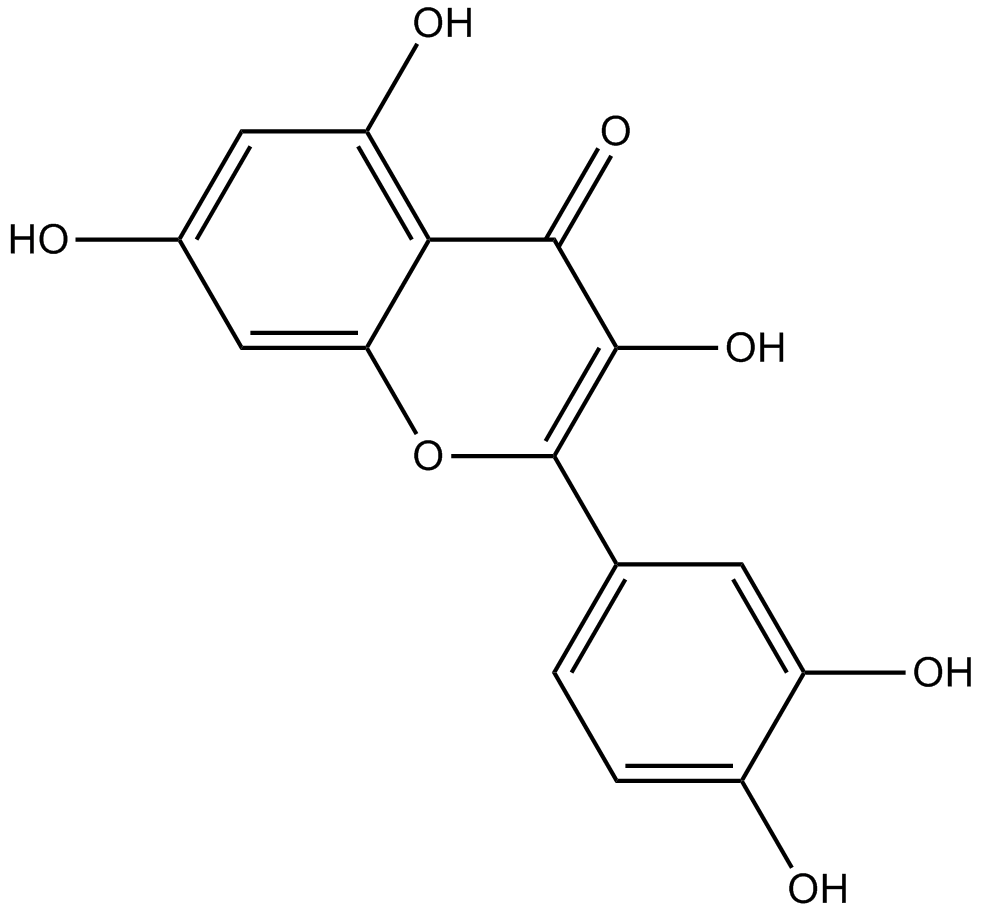Quercetin |
| Catalog No.GN10266 |
La quercetina es un flavonoide dietético importante, presente en verduras, frutas, semillas, nueces, té y vino tinto.
Products are for research use only. Not for human use. We do not sell to patients.

Cas No.: 117-39-5
Sample solution is provided at 25 µL, 10mM.
Quercetin is an important dietary flavonoid, present in vegetables, fruits, seeds, nuts, tea and red wine. It has various biological functions in terms of tumor prevention. Quercetin is a strong inhibitor of PI3K, NF-κB, and other kinases involved in intracellular signaling. It can also mildly inhibit Akt1/2, and slightly affect PKC, p38 and ERK1/2 [1].
A number of reports have demonstrated that Quercetin possessed anti-inflammatory, anti-oxidant and pro-apoptotic functions in cancer cells and inhibited tumor progress with different mechanisms. Quercetin increased cytosolic Ca2+ levels and disrupted the mitochondrial membrane potential (MMP), which in turn promoted the release of cytochrome c in the cytoplasm, thus activating multiple caspases such as caspase-3, -8 and -9 and subsequently inducing apoptosis via mitochondrial pathway [2]. Quercetin induced cell-cycle arrest and apoptosis, which was associated with the function of p53. Quercetin could promote p53 phosphorylation and therefore stabilize p53 both at the mRNA and protein level [3]. However, several studies investigated that cells with impaired p53 became more sensitive to Quercetin mediated cytotoxicity and apoptosis [4].
In vivo studies showed that administration of Quercetin before the initiation stage of carcinogenesis dramatically reduced various chemical agents induced tumor burden in mice models, including benzo(a)pyrene-induced lung tumor burden, azoxymethane-induced preneoplastic lesions in rat colon and N-nitrosodiethylamine-induced hepatocarcinoma etc. [5].
References:
[1].Quercetin and cancer chemoprevention. Evid Based Complement Alternat Med. 2011;2011:591356. doi: 10.1093/ecam/neq053. Epub 2011 Apr 14.
Food-derived polyphenols inhibit pancreatic cancer growth through mitochondrial cytochrome C release and apoptosis. Int J Cancer. 2002 Apr 10;98(5):761-9.
[2].Stabilization of p53 is involved in quercetin-induced cell cycle arrest and apoptosis in HepG2 cells. Bioscience, Biotechnology and Biochemistry. 2008;72(3):797–804.
[3].Survivin and p53 modulate quercetin-induced cell growth inhibition and apoptosis in human lung carcinoma cells. The Journal of Biological Chemistry. 2004
[4].The effects of quercetin on antioxidant status and tumor markers in the lung and serum of mice treated with benzo(a)pyrene. Biological and Pharmaceutical Bulletin. 2007
Average Rating: 5 (Based on Reviews and 30 reference(s) in Google Scholar.)
GLPBIO products are for RESEARCH USE ONLY. Please make sure your review or question is research based.
Required fields are marked with *




